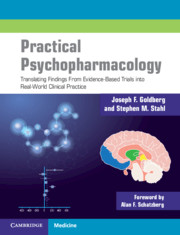 Practical Psychopharmacology
Practical Psychopharmacology Book contents
- Practical Psychopharmacology
- Practical Psychopharmacology
- Copyright page
- Dedication
- Contents
- Foreword
- Preface
- Abbreviations
- Part I General Principles
- Part II Targets of Pharmacotherapy
- 13 Disordered Mood and Affect
- 14 Disorders of Impulsivity, Compulsivity, and Aggression
- 15 Psychosis
- 16 Deficit States and Negative Symptoms
- 17 Anxiety
- 18 Addiction and the Reward Pathway
- 19 Trauma and Post-traumatic Stress Disorder
- 20 Personality Disorders and Traits
- 21 Cognition
- 22 Putting It All Together
- References
- Index
17 - Anxiety
from Part II - Targets of Pharmacotherapy
Published online by Cambridge University Press: 19 October 2021
- Practical Psychopharmacology
- Practical Psychopharmacology
- Copyright page
- Dedication
- Contents
- Foreword
- Preface
- Abbreviations
- Part I General Principles
- Part II Targets of Pharmacotherapy
- 13 Disordered Mood and Affect
- 14 Disorders of Impulsivity, Compulsivity, and Aggression
- 15 Psychosis
- 16 Deficit States and Negative Symptoms
- 17 Anxiety
- 18 Addiction and the Reward Pathway
- 19 Trauma and Post-traumatic Stress Disorder
- 20 Personality Disorders and Traits
- 21 Cognition
- 22 Putting It All Together
- References
- Index
Summary
Ostensibly innocuous, yet deceptively so, like Monty Python’s fabled Killer Rabbit of Caerbannog (but with no Holy Hand Grenade of Antioch to lob as a countermeasure), anxiety often stands underappreciated for its pernicious and often devastating ill effects. Less profound and baffling than the perceptual and ideational anomalies of psychosis, less emotionally wrenching or blatantly lethal than suicidal melancholy, and less relentlessly haunting than the psychic sequelae of trauma, anxiety may be the prime example of a normal human emotion gone awry. While “normal” anxiety cues vigilance to environmental threats, demands, and rewards, aberrant anxiety paralyzes cognitive function, over-rides judgment, subverts harm appraisal, drives impulsive action, and generally worsens the prognosis and treatment responsiveness of any coexisting psychiatric problem. It is also easily mistaken for other forms of psychopathology that involve autonomic hyperarousal and psychomotor activation, potentially driving wrong pharmacotherapy decisions.
- Type
- Chapter
- Information
- Practical PsychopharmacologyTranslating Findings From Evidence-Based Trials into Real-World Clinical Practice, pp. 400 - 424Publisher: Cambridge University PressPrint publication year: 2021


